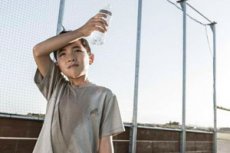New publications
Extreme heat is linked to hospitalizations of children with asthma
Last reviewed: 02.07.2025

All iLive content is medically reviewed or fact checked to ensure as much factual accuracy as possible.
We have strict sourcing guidelines and only link to reputable media sites, academic research institutions and, whenever possible, medically peer reviewed studies. Note that the numbers in parentheses ([1], [2], etc.) are clickable links to these studies.
If you feel that any of our content is inaccurate, out-of-date, or otherwise questionable, please select it and press Ctrl + Enter.

For children receiving care at an urban pediatric center in California, extreme heat was associated with increased asthma hospitalizations, according to a study published at the ATS 2024 International Conference, which was held May 17-22 in San Diego.
"We found that both daily hot days and extreme temperatures that lasted multiple days increased the risk of asthma hospitalizations , " said lead study author Morgan Ye, MPH, a data analyst in pulmonary and critical care medicine at the University of California, San Francisco School of Medicine.
"Understanding the impact of climate events such as extreme heat on vulnerable populations is key to reducing the burden of disease caused by climate change."
Ms. Yeh and her colleagues examined electronic health records from 2017 to 2020 from UCSF Benioff Children's Hospital Oakland, which included data on asthma hospitalizations of the hospital's patients, some of whom were from the Federally Qualified Health Center Benioff Oakland, and demographic data including patients' ZIP codes.
They used data from Oregon State University’s PRISM Climate Group to determine the timing of maximum (daytime heat waves) and minimum (nighttime heat waves) temperatures for each ZIP code. The researchers limited their analyses to the region’s warm season (June through September).
To assess the potential range of effects of different heat wave measurements, they used 18 different heat wave definitions, including the 99th, 97.5th, and 95th percentiles of the overall distribution over the study period of one, two, or three days.
They designed the study to determine the association between each heat wave definition and hospitalization. They repeated the analysis for ZIP codes in the San Francisco Bay Area and Central California.
The team found that daytime heat waves were significantly associated with a 19% increase in the odds of childhood asthma hospitalizations, with longer heat waves doubling the odds of hospitalizations. Nighttime heat waves showed no association.
According to Ye, "We continue to see rising global temperatures due to human-induced climate change, and we can expect to see an increase in health problems as we see longer, more frequent and more severe heat waves.
"Our study shows that higher temperatures and longer duration of these hot days are associated with an increased risk of asthma hospitalisations. Children and families with less adaptive capacity will experience the greatest burden.
"Therefore, it is important to better understand these heat-related risks and vulnerable populations for future monitoring and targeted interventions."
The authors note that previous studies have shown positive associations between extreme heat and asthma, but results regarding hospitalizations and emergency department visits have been inconsistent.
Additionally, many other studies focused on respiratory hospitalizations rather than specifically asthma hospitalizations and did not include children.
This study is also unique in that it examined the effects of both daily high temperatures and long-term extreme temperatures.
The San Francisco Bay Area and California in general are unique areas of interest because the state is considered a coastal region with less prevalence of cooling systems such as air conditioning. While temperatures may not reach the extremes seen in other parts of the country, this study demonstrates that even moderate temperature extremes can have significant impacts on health.
These effects are more pronounced in climate-sensitive populations, including children and those who are medically vulnerable, such as patients at the urban pediatric center that participated in the study. The authors hope that the results of this study will lead to more equitable health outcomes and a reduction in racial/ethnic disparities observed in climate-sensitive events.
"These findings can be used to inform targeted interventions and resource allocation for vulnerable children and reduce health-related stress during heatwaves," they conclude.
